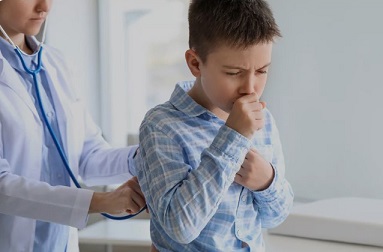Whooping Cough In United Kingdom Kills 5 Babies And Infects 2,793 In The First Quarter Of 2024
Nikhil Prasad Fact checked by:Thailand Medical News Team May 10, 2024 11 months, 2 weeks, 2 days, 8 hours, 49 minutes ago
Medical News: The recent surge of whooping cough cases in the United Kingdom has sent shockwaves through public health circles, with five infant deaths and a staggering 2,793 confirmed cases in the first quarter of 2024 alone. This outbreak is not just a statistical anomaly; it represents a significant public health crisis that demands thorough examination, understanding, and action.
 Whooping Cough In United Kingdom Kills 5 Babies And Infects
Whooping Cough In United Kingdom Kills 5 Babies And Infects
2,793 In The First Quarter Of 2024
Unpacking the Whooping Cough Epidemic
Whooping cough, also known as pertussis, is a highly contagious respiratory infection caused by the bacterium Bordetella pertussis. The disease spreads through respiratory droplets when an infected person coughs or sneezes, making it particularly dangerous in close-knit communities, schools, and households. What makes whooping cough especially insidious is its initial resemblance to a common cold, making early detection challenging.
The progression of whooping cough follows a distinct pattern. Initially, the symptoms mimic those of a cold, with a runny nose, mild cough, and low-grade fever. However, after one to two weeks, the characteristic coughing fits begin. These fits are often severe, persistent, and marked by a "whooping" sound as the person struggles to breathe. Infants under six months, in particular, are at heightened risk due to their underdeveloped immune systems and airways.
Alarming Statistics and Trends
The data from the UK Health Security Agency (UKHSA) paints a grim picture of the current whooping cough outbreak. In March alone, 1,319 cases were confirmed, contributing significantly to the cumulative total for the quarter. What's even more concerning is that over half of these cases (51%) were in individuals aged 15 and older, dispelling the myth that whooping cough primarily affects infants.
https://www.gov.uk/government/news/whooping-cough-cases-continue-to-rise
Dr Gayatri Amirthalingam, a consultant epidemiologist at UKHSA, expressed deep concern about the trajectory of the outbreak. Comparisons with previous peak years, notably 2012 and 2016, suggest that the current numbers may surpass those benchmarks if swift and decisive action is not taken.
Root Causes and Contributing Factors
Understanding why whooping cough has resurged with such ferocity in 2024 requires a multifaceted analysis. Several factors contribute to the vulnerability of populations to this infectious disease:
-Vaccination Gaps: Despite the availability of effective vaccines, there has been a concerning decline in vaccination uptake. Pregnant women, who play a crucial role in transmitting immunity to their newborns, have seen a drop in vaccination rates. This gap in herd immunity creates pockets of susceptibility, allowing the bacterium to thrive and spread.
-Pandemic Fallout: The COVID-19 pandemic disrupted routine healthcare services, including immunization
programs. Missed vaccinations, delayed booster shots, and reduced healthcare access during lockdowns have all contributed to a population more susceptible to vaccine-preventable diseases like whooping cough.
-Educational and Awareness Gaps: Public awareness campaigns about the importance of vaccination, recognizing early symptoms, and seeking timely medical care are essential. Addressing misconceptions, promoting vaccination as a public good, and enhancing healthcare infrastructure are critical components of a comprehensive response.
Vaccination: A Critical Defense
Amidst the concerning statistics and complex factors contributing to the outbreak, vaccination remains the cornerstone of defense against whooping cough. In the United Kingdom, a "six-in-one" combined vaccine is administered to infants at specific intervals, offering protection not just against pertussis but also other infectious diseases like diphtheria, tetanus, and polio. Maternal vaccination programs have also been instrumental in protecting newborns during their vulnerable early months.
International Comparisons: Insights from Ireland
The whooping cough epidemic is not confined to the UK alone. Countries like Netherlands, Czech Republic, China, South Africa, Philippines, Israel and even certain states in the United States have also witnessed a surge in cases, highlighting the global nature of infectious disease challenges. Numerous
Medical News reports have emerged since the start of 2024 detailing whooping cough outbreaks and growing numbers of infections in various geolocations across the world. Similar patterns of vaccination gaps, pandemic disruptions, and educational needs are evident in many of these geolocations, emphasizing the interconnectedness of public health responses.
A Call to Action: Mitigating the Crisis
Addressing the whooping cough crisis demands a coordinated, multifaceted approach:
-Enhanced Vaccination Campaigns: Robust vaccination campaigns targeting at-risk populations, including pregnant women, infants, and school-aged children, are paramount. These campaigns should focus not only on vaccine availability but also on dispelling myths and addressing vaccine hesitancy.
-Improved Surveillance and Reporting: Timely and accurate data collection, surveillance, and reporting are essential for tracking the spread of whooping cough, identifying hotspots, and implementing targeted interventions.
-Community Engagement: Engaging communities, healthcare providers, educators, and policymakers in proactive dialogue and action is crucial. Empowering individuals with knowledge, resources, and access to healthcare services can significantly impact disease prevention and control.
-Investment in Healthcare Infrastructure: Strengthening healthcare infrastructure, from vaccination clinics to diagnostic laboratories, is fundamental to mounting an effective response. This includes ensuring adequate vaccine supply chains, skilled healthcare professionals, and robust surveillance systems.
Conclusion: Charting a Path Forward
In conclusion, the whooping cough outbreak in the United Kingdom underscores the fragility of public health systems and the need for continuous vigilance and preparedness. By addressing vaccination gaps, enhancing public awareness, fostering international collaboration, and investing in healthcare infrastructure, we can mitigate the impact of whooping cough and prevent future outbreaks. The time to act is now, as every vaccination and preventive measure taken today can save lives and safeguard communities tomorrow.
For the latest updates about whopping cough and outbreaks globally, keep on logging to Thailand
Medical News.
